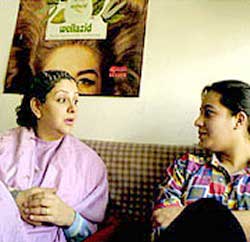One customer at Nimo's heard a conservative Muslim religious leader on local radio calling for all women to wear the hijab, a head covering. Religious services have been attended as never before. "I want to move freely, live a joyful life out in the open," said Nimo Din'Kha Skander, the owner of the salon. Nimo's is small but well known; Ms. Din'Kha Skander likes to recall how Saddam Hussein's second wife had her hair done there. "I don't want a government of religion," Ms. Din'Kha Skander continued. Religion, she said, is "a private thing." During the past decade, younger women have grown more literal with their Islam. If a decade ago, only 2 or 3 women out of a college class of 30 were covering their heads, said Tara al-Chalabi, 31, a member of the United Nations staff here, now the ratio is reversed. She attributes that to the constraints and privations that have shaped young people's lives. Suha Turaihi, a retired diplomat who served in India, elaborated: "For 20 years they didn't travel — they were not exposed to Western values as we were. They are children of wars and embargo." At the same time, women's rights were being curtailed by Mr. Hussein's edicts. For instance, women younger than 45 have not been allowed to travel alone, but have had to be accompanied by brothers, fathers or sons. The restrictions as well as the recent social conservatism have come as a blow to older, educated women, who fought against head scarves, arranged marriages and other constraints. "I can't bear it, I can't accept it," said Amel al-Khoudairy, owner of an art gallery that was destroyed in the looting that followed the toppling of the government. "It was our pride that we didn't wear hijab. I was one of the first in my family not to." Beginning in the 1920's, women began getting university educations, first to become teachers and later to enter medicine, diplomacy and other professions. By the 1950's, women were traveling abroad alone to study. Ms. Turaihi left for college in Beirut in 1956 at age 18. She said she was so focused on her career as a diplomat that she never married. The question in the beauty parlor — a one-room shop in Baghdad's bustling Karrada neighborhood — was what would happen next. An American-led team is running the country, a force that most said they rarely saw or heard. In the opinion of some Iraqi women, Americans are the preferred leaders. An American-led government could be more amenable to women in politics, they said. "When an Iraqi comes to rule, after two years he turns on us — he becomes a dragon," said Hanah Radhi, wearing a hajib as she waited for a facial. Of the 12 women interviewed for this article, mostly middle- and upper-class women in Baghdad, Iraq's most cosmopolitan city, only Ms. Turaihi thought it possible that a religious leader could be voted into power. Suad al-Radhi, 85, said Iraqi society was too diverse, with many religious groupings — Sunni, Shiite, Christian — for any one to take over. "In Iraq, religion did not play the central role," said Ms. Radhi, former head in Baghdad of the Red Crescent, a counterpart to the Red Cross. "The country is made of several religions. That created tolerance." Even if one group became strong enough and was supported by a majority of the people, the United States would not allow a religious leader to run the government, predicted Balkis Mj-ali, a political scientist at Baghdad University. "America will not give the freedom to the Iraqi government to do what it wants," she said. "Elections are a well-known game. Leaders will come and go, but America will still be in control of Iraq, its oil and its future." Nuha al-Radhi, the daughter of Suad al-Radhi, is an artist and writer who spent the last seven years in Lebanon after publishing "Baghdad Diaries," a book she feared would cause her trouble with the government. Back in Baghdad as of Thursday, she expressed frustration with the United States, saying it has so far mismanaged the postwar occupation and has been too slow to restore public services. "America is in its ivory tower palace," she said, referring to the American authorities based in a palace. "We are used to having coups and revolutions. But usually people who stage them take over the country afterward." At home with her mother, Ms. Radhi said, "Iraqi women are tough as old boots." Her mother added, "They have always kept this country going." As for religion, the daughter said, "we are not dogmatic, just a little fiery."
|
